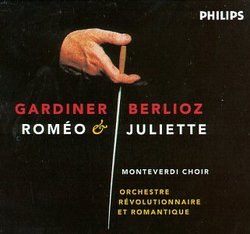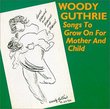| All Artists: Hector Berlioz, John Eliot Gardiner, Jean-Paul Fouchécourt, Catherine Robbin, Orchestre Revolutionnaire et Romantique, The Monteverdi Choir, Gilles Cachemaille Title: Berlioz - Romeo & Juliette / Robbin · Fouchecourt · Cachemaille · Gardiner Members Wishing: 0 Total Copies: 0 Label: Polygram Records Release Date: 4/14/1998 Genre: Classical Styles: Opera & Classical Vocal, Symphonies Number of Discs: 2 SwapaCD Credits: 2 UPC: 028945445427 |
Search - Hector Berlioz, John Eliot Gardiner, Jean-Paul Fouchécourt :: Berlioz - Romeo & Juliette / Robbin · Fouchecourt · Cachemaille · Gardiner
 | Hector Berlioz, John Eliot Gardiner, Jean-Paul Fouchécourt Berlioz - Romeo & Juliette / Robbin · Fouchecourt · Cachemaille · Gardiner Genre: Classical
|
Larger Image |
CD DetailsSimilarly Requested CDs
|
CD ReviewsThe most romantic work of a true Romantic. Bob Zeidler | Charlton, MA United States | 04/25/2002 (5 out of 5 stars) "Hector Berlioz carried throughout his life a mere handful of artistic "heroes" for inspiration: Virgil, Gluck, Beethoven, Goethe and Shakespeare principally; Byron and Spontini to a lesser extent. Each of these was to inform his compositions in, typically, a rather direct way: for example, Beethoven for the "Symphonie fantastique" (most particularly the "Scene aux Champs," a tribute to Beethoven's Pastoral Symphony), Byron for "Harold en Italie," Goethe for "La Damnation de Faust," and Virgil and Gluck for "Les Troyens" (his final, and crowning, achievement). In some respects, Shakespeare had the greatest hold over him, and "Romeo et Juliette" was the direct consequence of this hold. Many consider this his greatest and most revolutionary work (an opinion that I happen to share). The work, despite its use of soloists and chorus, is nonetheless a symphony (a Dramatic Symphony, as Berlioz would describe it). Cast in seven movements - very unorthodox for its time - it shows Berlioz at the absolute peak of his creative powers as an orchestral composer. Berlioz was the "inventor" of the modern symphony orchestra as we know it today. By the time he composed "Romeo et Juliette," he had already added several new instruments to the orchestra, had increased it in size, and had turned it into a virtuoso ensemble (in part through his introduction of "section rehearsals"). "Romeo et Juliette" was cast by him as a showpiece for this virtuoso ensemble. He wrote in his "Memoirs" regarding his choice of instruments over voices for the most dramatic sections of the work: "...the very sublimity of the love story renders depiction so hazardous for the composer that he has had to lend his imagination a freedom which the limiting sense of sung words would never allow, and to resort to the language of instruments, a language richer, more vivid, less hindered, and, by its very vagueness, more powerful." Indeed! I couldn't agree more. This performance by John Eliot Gardiner and his Orchestre Révolutionnare et Romantique, Montiverdi Choir and soloists, is superb on all accounts and special in some key respects. Those familiar with Gardiner's earlier HIP (historically-informed performances) of Berlioz, such as the "Symphonie fantastique" and "Harold en Italie," will already be familiar with his use of the earlier ophicleide rather than the later bass tuba which succeeded it, and other "HIP" touches to the instrumetation. More importantly -- much more so -- is the fact that Gardiner presents ALL of the known versions of some of the sections of the work, so that you -- the listener -- have the choice of listening to either (a) the original 1839 version, (b) the revised 1845 version, or (c) a composite version of Gardiner's own devising, based on his experiences spread over numerous performances of these versions. Personally, I think that Gardiner "got it right" with his own choice of versions and their ordering; this is the "default" order in which they are played if you do not take the trouble to program your CD player. The soloists are uniformly fine. (Gilles Cachemaille, the excellent Pére Laurence here, is a well-known Berlioz "specialist.") The chorus and soloists together do a splendid job of "commenting on the dramatic action" (along the lines of the classic Greek chorus), setting the stage in the two prologues for the drama contained in the instrumental music to come, and as well serving to provide a "Montague and Capulet reconcilliation" at the end. But the orchestra is the true star of this performance, as Berlioz planned for it to be. Gardiner gets exceedingly fine and idiomatic playing from his orchestra in the famous "Love Scene," "Queen Mab Scherzo" and "Tomb Scene." The recorded sound is rich, resplendent, sonorous; all one could ask for, in fact. There are those who swear by Sir Colin Davis's Berlioz, and swear at John Eliot Gardiner's, and vice versa. I have both. And I wouldn't want to be without either. Bob Zeidler" More scholarly than musical, but still one of Gardiner's bet Santa Fe Listener | Santa Fe, NM USA | 01/04/2008 (4 out of 5 stars) "I am a non-fan of Gardiner, who seems to me to be an elevated amateur conductor, but there's no doubt that he's intelligent and deeply versed in period practice. He gives us the only HIP version of Romeo et Juliette on the market, and it's never less than interesting. As his Symphonie fantastique illustrated, Berlioz aounds rawer and more eccentric on period instruments, and the absence of vibrato, although initially off-putting in such a romantic work, adheres to correct practice in the composer's time. The listener immediately notices that textures are leaner and keener than in any previous recording, so this performance gets full points for originality, as well as for offering every variant of several numbers than Berlioz altered between the 1839 premiere and the 1845 published score.
Ultimately, it takes all these extraneous factors to salvage a performance that isn't musically equal to any of the best rivals (Levine on DG being a stellar example, not to mention Colin Davis's three readings). Gardiner makes Berlioz's full-blooded emotions sound puny and his luscious orchestration scrawny. He drives the fast music hard and hasn't the stick technique to bring out virtuosity in his Revolutionaire et Romantique orchestra -- in any case, how could they possibly compete with Munch's BSO, Davis's London Sym., or Levine's Berlin Phil.? One thing here is truly outstanding, the Monteerdi Choir, who pinpoint French and flexible phrasing is the best to be heard in any performance. As for the soloists, they are light-voiced and appealing, a nice change from the usual opera star. Balancing pluses and minuses, the novelty of this performance outweighs Gardiner's shortcomings, and the outcome is a definite recommendation, just as long as I can have two or three better versions to live with, also." |

 Track Listings (13) - Disc #1
Track Listings (13) - Disc #1


![Seussical [2000 Original Broadway Cast]](https://nationalbookswap.com/cd//m/02/4802/514802.jpg)





